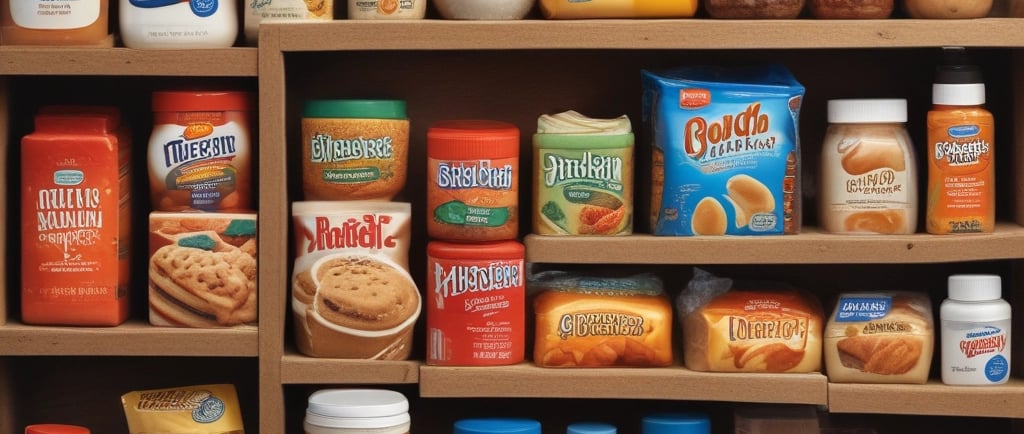Beyond the Label: Why You Should Care About Emulsifiers
Ever wonder what keeps your favorite processed foods so perfectly smooth? The secret is often an emulsifier. While these common additives are everywhere from ice cream to salad dressing, new research suggests some of them could be messing with your gut health. In this post, we break down what emulsifiers are, which ones to look for, and why cutting back on them might be a good move for your well-being.
AVOIDGUT-HEALTHFOOD
8/15/20253 min read


Have you ever wondered how your favorite creamy salad dressing stays perfectly mixed instead of separating into oil and vinegar? Or how that store-bought ice cream stays so smooth and doesn't get icy?
The secret ingredient is often an emulsifier.
These clever little food additives are the peacemakers of the kitchen, helping ingredients that don’t naturally mix—like oil and water—to get along. Food manufacturers use them to create the smooth textures we love, prevent products from separating on the shelf, and make everything look and feel more appealing.
What to Look for: Spotting Emulsifiers in Your Food
Emulsifiers are everywhere, especially in ultra-processed foods. When checking the ingredients list, keep an eye out for these terms, which are often linked to concerns about gut health:
Polysorbate 80
Carboxymethylcellulose (CMC)
Carrageenan
Maltodextrin
Xanthan Gum
Mono- and diglycerides of fatty acids
These ingredients are commonly found in products like baked goods, ice cream, creamy sauces, processed meats, and dairy-free alternatives.
Why the Concern? Emulsifiers and Your Gut
So, what's the big deal? Your gut is home to trillions of bacteria—your gut microbiome—and they play a huge role in your overall health. Think of your gut lining as a fortress, protected by a thick, slimy shield of mucus that keeps everything in balance.
New research from respected journals suggests that certain synthetic emulsifiers might be the enemy of that fortress. The scientific train of thought goes like this:
They are like detergents. The way emulsifiers break down fat and water is similar to how a detergent works. When you eat them, these additives can wear down that protective mucus shield in your gut.
An exposed gut is an unhappy gut. When this protective layer thins out, bacteria can get too close to the intestinal wall. This close contact can trigger a low-grade inflammatory response from your immune system¹.
Chronic inflammation is a problem. Long-term, low-grade inflammation is a suspected factor in a number of serious health issues, including inflammatory bowel diseases (like Crohn's and colitis) and metabolic syndrome (linked to obesity and diabetes)².
This isn't about one-time exposure; it's about the cumulative effect of regularly consuming these additives in a diet heavy with ultra-processed foods.
Are All Emulsifiers Bad?
The good news is, no! It’s not a black-and-white issue.
The research raises the most red flags for specific synthetic emulsifiers like the ones listed above.
Other, more natural emulsifiers, such as soy lecithin (found in eggs and soybeans), have not shown the same negative effects and are generally considered safe.
So, while not every emulsifier is a villain, a good rule of thumb is to be mindful of the ultra-processed foods that contain the problematic synthetic varieties. By choosing to eat more whole, unprocessed foods, you naturally reduce your intake of these additives and give your gut a chance to thrive.
Don't Just take my word for it. Read up on the findings:
¹ Dietary Emulsifiers Impact the Mouse Gut Microbiota Promoting Colitis and Metabolic Syndrome. Nature, 2015. This foundational study in mice found that the synthetic emulsifiers polysorbate 80 and carboxymethylcellulose can alter the gut microbiota and disrupt the intestinal mucus layer, leading to low-grade inflammation and metabolic syndrome.
² The Emulsifier Carboxymethylcellulose Induces More Aggressive Colitis in Humanized Mice with Inflammatory Bowel Disease Microbiota Than Polysorbate-80. Nutrients, 2021. This research on mice with human gut bacteria demonstrated that carboxymethylcellulose can worsen inflammation and lead to a more aggressive form of colitis, highlighting its role in inflammatory bowel disease.
³ The Effects of Carrageenan and Maltodextrin on the Microbiome and Inflammation. Nutrients, 2020. This review article highlights research suggesting that both carrageenan and maltodextrin may disrupt the gut microbiome and promote inflammation in the intestine, linking them to health concerns.
⁴ Dietary Emulsifiers and the Risk of Cancer. PLOS Medicine, 2022. This large-scale study on a French population found a link between a higher intake of mono- and diglycerides of fatty acids and an increased overall risk of cancer.
© 2025. All rights reserved.
